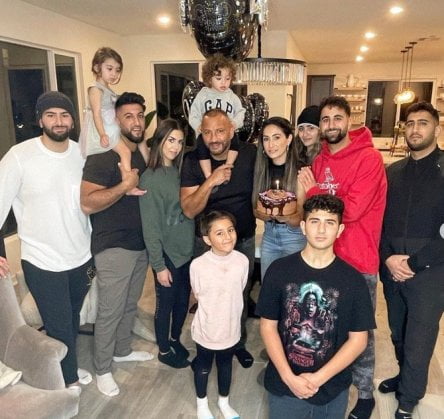
Social media is inundated with offensive content, including hate, anger, personal attacks and, of course, exaggerated and false claims. Much of it is driven by angry political hyperbole and partisan attacks. It can be nauseating.
But every once in a while you come across a social media account that is both positive and fun. And when you find one that also showcases positive views of Arab culture and life, it is even more satisfying.
Salem Furrha, who is Palestinian, was born in Kuwait. When he came to the US he first lived in Michigan before moving to California, where he now resides with his Palestinian-Lebanese wife, Samah, and their eight children. Last year, to overcome the boredom of coronavirus lockdowns and other restrictions, he launched a family account on TikTok, a social media site that allows users to share short videos.
The content on the platform can sometimes border on the salacious but the Furrha family’s account uses it in a more constructive and wholesome way to offer a positive look at what everyday life in the US is like for Arab Americans.
When I get bored or nauseated by the political fighting that increasingly dominates other social-media sites — especially the endless stream of negative portrayals of Arabs and Muslims, and hate driven debates — I turn to the Furrhas for a little respite. In the worst moments, when my social-media feeds are in danger of being buried by an avalanche of anti-Arab stereotypes, I take a detour to this more pleasant and welcoming corner of the information superhighway, slow down and savor the family’s posts.
I recently had the pleasure of meeting the Furrha family, virtually, during a zoom conference hosted by Arab America, a national media organization that aims to promote an accurate, positive image of Arab Americans and the Arab world. Furrha and his family should be official icons of Arab Americans, our ambassadors to the rest of the country and the world.
“We wanted to show people we are a close-knit family and we always stick together … we like to be around each other,” Furrha told me. “We try to make people understand how we can all get along even though there are a lot of people in one house.
“That’s Arab culture. We stick together. We try to educate people on Arab culture, and use comedy and humor to bridge the gap of what people see.”
The Furrha family has more than 3.3 million followers on TikTok, and millions more on Facebook and Instagram. The secret to building such an impressive following is simple, said Furrha.
“We like to portray our everyday life in a comedic way,” he explained. “There is a lot of stereotypical stuff about Arabs that is not true … so we want to show how we really are.”
Of course with so many people watching what you do, inevitably there are going to be some negative comments and criticisms, even personal attacks that are often racist and bitter. When asked how he and his family deal with this, Furrha shrugged his shoulders and offered the perfect response.
“We concentrate on the positive comments,” he said. “We ignore the negative comments. We don’t pay attention to them. We try to respond to comments on the chat and interact and engage our followers.”
It is a refreshing attitude, as it can be tough for Arabs to resist the temptation to respond to someone who insults you, especially on social media. It takes a lot of self control.
TikTok has become one of the most influential social media platforms, as it is perceived as being more transparent and so less restrictive than Twitter or Facebook, which often censor or add warnings to posts about controversial topics or which include disputed information.
Sometimes these restrictions can reflect inherent anti-Arab bias. Many pro-Palestinian posts are either blocked or “throttled” on Facebook and on Twitter, for example. Throttling on social media refers to the use of algorithms that restrict the visibility of posts, in terms of how many people get to see them, short of shutting down an account entirely. In many cases, users do not even know they have been throttled.
But on TikTok, the restrictions are more explicit and clearly stated: no violence, no hate or racist comments, and a requirement for generally acceptable Western standards of modesty (which might still be a little risque for some in the Middle East).
Former US President Donald Trump tried to shut down TikTok because its parent company, ByteDance, is based in Beijing. He argued that the platform could be used “as an arm of the Chinese Communist Party” to “spy on American citizens.”
President Joe Biden has suspended Trump’s efforts to shut TikTok down, or force it to be sold to an American company, while his administration examines the issue.
This is good news for the Furrhas as it means that, for now at least, they can continue to use the platform to share with millions of people their humorous depictions of the everyday lives of a typical Arab American family.
Do not be surprised if some enterprising television producer in Hollywood catches on to their growing popularity and offers the Furrhas a chance to appear in their own reality show.
Come to think of it, having Arab Americans appear in a US reality-TV show that portrays them in a positive way might be exactly what we need to counter the lies, stereotypes and anti-Arab anger that persists here.
Source: Arab News





